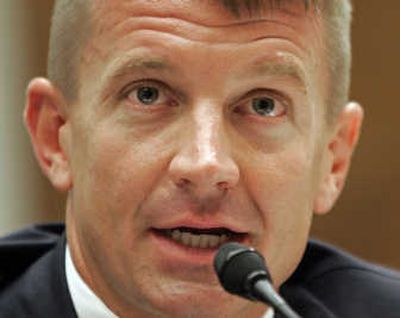Blackwater guards were given immunity

WASHINGTON – Potential prosecution of Blackwater guards allegedly involved in the shooting deaths of 17 Iraqi civilians last month may have been compromised because the guards received immunity for statements they made to State Department officials investigating the incident, federal law enforcement officials said Monday.
FBI agents called in to take over the State Department’s investigation two weeks after the Sept. 16 shootings cannot use any information gleaned during questioning of the guards by the department’s Bureau of Diplomatic Security, which is charged with supervising security contractors.
Some of the Blackwater guards have subsequently refused to be interviewed by the FBI, citing promises of immunity from State, one law enforcement official said. The restrictions on the FBI’s use of their initial statements do not preclude prosecution by the Justice Department using other evidence, the official said, but “they make things a lot more complicated and difficult.”
Under State Department contractor rules, Diplomatic Security agents are charged with investigating and reporting on all “use of force” incidents. Although there have been previous Blackwater shootings over the past three years – none of which resulted in prosecutions – the Sept. 16 incident was by far the most serious. The Bureau of Diplomatic Security was under pressure to quickly determine what had happened in what soon became a major controversy in Baghdad and Washington.
It is unclear when or by whom the grant of immunity was explained to the guards. Under federal case law applying to government workers, only voluntary answers to questions posed by the employing agency can be used against them in a criminal prosecution. If an employee is ordered to answer under threat of disciplinary action, the resulting statements cannot be used.
“You can’t use the fruits of that statement,” another law enforcement official said. “It doesn’t prevent them from talking (to the FBI), but … why run the risk? I think any lawyer would advise against it. “
Diplomatic Security spokesman Brian Leventhal declined to comment on the situation, first reported Monday by the Associated Press. Anne Tyrrell, a spokeswoman for North Carolina-based Blackwater Worldwide, also declined to comment.
State Department spokesman Sean McCormack referred all questions to the Justice Department. “But if anyone has broken the rules or applicable laws, they should be held to account,” McCormack said.
Blackwater chief executive Erik Prince has said the personal security guards, contracted by the State Department from his company to protect U.S. diplomats in Iraq, came under fire in a Baghdad traffic circle and shot only in self-defense. But the Iraqi government, which has conducted its own investigation, concluded that the Blackwater guards fired the only shots in the incident and were completely at fault. A U.S. military investigation also concluded that the shootings were unprovoked.
Amid growing diplomatic tension and congressional criticism, Secretary of State Condoleezza Rice asked the FBI to take over the case to avoid an appearance of a conflict of interest.
Although the FBI maintains an office at the U.S. Embassy in Baghdad, a team of Washington-based agents was dispatched as insurance against what one administration official called a possible “taint” on the investigation’s objectivity. To ensure a firewall, FBI investigators were barred from reading interviews and reports on the incident gathered by Diplomatic Security.
Several of the Blackwater personnel, however, asserted that they had already told their stories, under immunity grants from the State Department, and declined FBI interviews that could be used against them, law enforcement officials said.
The FBI investigators are due to return to Washington early this week and will then turn the information they gathered over to the Justice Department, which will decide whether prosecution is warranted. An earlier case, involving the shooting of a bodyguard of an Iraqi vice president by a Blackwater contractor last Christmas Eve, was referred to Justice months ago, but there has been no prosecution.